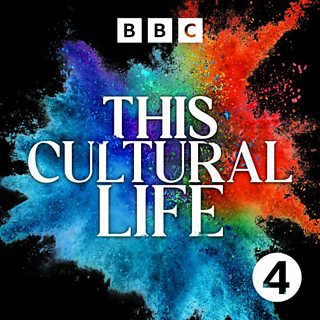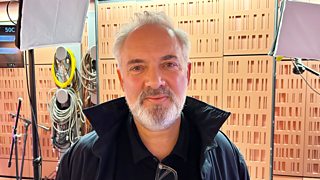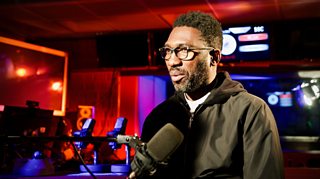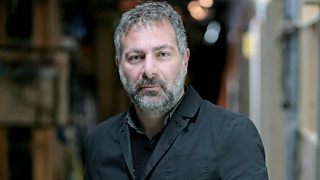Sam Mendes: Nine things we learned from his This Cultural Life interview
It’s no exaggeration to say that Sam Mendes is one of Britain’s best, and best-known, directors, across movies and theatre. After making his name in theatre, establishing the ground-breaking Donmar Warehouse in London, Mendes moved into cinema, finding instant success. He won an Oscar for his directing debut, American Beauty, and enjoyed a string of critical hits before directing the two highest-grossing Bond films ever: Skyfall and Spectre. As he releases Empire of Light, his most personal film yet, Mendes sits down with interviewer John Wilson on This Cultural Life to talk about his influences.
Here are nine things we learned...
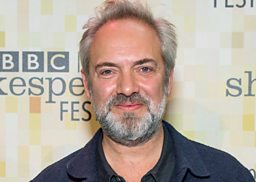
1. He became a director by accident
Mendes says he was always a storyteller. “My dad, I think, still has a reel-to-reel recording of me telling stories to my unwilling cousins,” he says. But it was not a boyhood dream to be a director. He went to university hoping to become a journalist, but a suggestion from a friend changed the path of his whole life. “I was in his room and he took a play down from the shelf, called Little Malcolm and His Struggle Against the Eunuchs, and he said, ‘I’m thinking of directing a production… do you want to be in it?’ I said, ‘No. You should be in it and I should direct it.’” He knew from that experience that this was what he wanted to do. “I wasn’t very good at it yet, but I knew I had some instinct that was leading me forward.”
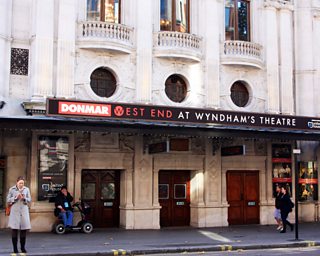
2. He established a groundbreaking theatre
Well before he worked in movies, Mendes worked in theatre. His first job was sweeping the stage at The Chichester Festival Theatre, for £49 a week. It was just two years later that he was directing plays in London, including The Cherry Orchard, starring Judi Dench. “I’ve never been good at watching my own first nights,” he says, “so I decided I was not going to watch. I was walking round Covent Garden… for the whole evening.” It was on this walk that he discovered a boarded-up building that would become The Donmar Warehouse. He found out who owned it and went to convince them to let him run it. It became one of Britain’s most influential theatres, opening with Stephen Sondheim’s Assassins, a musical about people who’ve tried to kill Presidents. “It was the perfect show to start that theatre, because it had everything,” says Mendes. “It was a piece of music theatre and it was edgy.” The theatre went on to make sell-out shows, including The Blue Room, Nicole Kidman’s West End debut, and become one of the most forward-thinking theatres in the UK. It made theatre cool. “It was a kind of pop art theatre,” says Mendes.
3. The theatre is where he found a functional family
Mendes says his own family was always fractured. “My parents separated when I was about three,” he says. “I’m an only child. I grew up almost entirely with my mum. My dad remarried.” It was in theatre that he found a more secure family. “All the families in my movies have basically been dysfunctional,” he says. “The functional families I’ve found in my life have been through my work. That was the first functional family I experienced, the family that lived at The Donmar for 10 years. I still miss that.”
4. His grandad taught him how to tell stories
He told us stories... I remember one where his friend had his head blown off and carried on running.Sam Mendes on his grandfather
Mendes didn’t grow up in a theatrical house, but he credits his grandfather, a novelist, with teaching him about storytelling. “Me and my cousins used to sit at his feet and bug him [to tell us stories about the war],” says Mendes. “He told us stories. Some shocking, some comic. I remember one where his friend had his head blown off and carried on running.” His grandfather’s stories became the inspiration for 1917, Mendes’s 2020 Oscar-winning movie.
5. He had to redo the first days of American Beauty
Mendes’s film debut was American Beauty, a story of families falling apart in private. He says it was quite heavily inspired by his favourite movie, Paris, Texas. He describes them both as stories about “entrapment and escape”. American Beauty won five Oscars, but it started terribly. “The first two days were a disaster,” says Mendes. “Fortunately for me, they were bad enough for me to see that they were wrong and ask to do them again. The performances were too big. The sets were underpopulated. I hadn’t handled the background properly. The lighting was too flat.” He said at one point he had to be reminded to say “cut” at the end of a take. “That’s how little I knew about it when I started,” he says. Thankfully, he was a very quick learner.
6. Daniel Craig gave the worst audition he’s ever seen
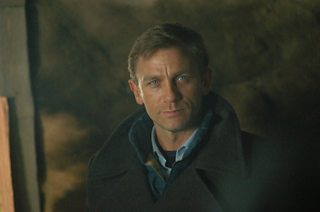
He did probably the worst audition I’ve ever seen… But he was incredibly charismatic.Sam Mendes on Daniel Craig
Well before he played Bond, Daniel Craig got a big career boost when he was cast in Mendes’s second film, Road to Perdition, as the calamitous younger brother of Tom Hanks’s gangster. “At the time, my eyes were cast firmly on my leading actors, who were huge movie stars: Tom Hanks, Paul Newman, Jude Law,” says Mendes. “The studio said, ‘Look, you can have your fourth actor, but we can’t afford what we’re paying the other three.'” Mendes needed someone inexpensive, so he auditioned Craig, who was no star at that point. “I was struck by a), his kinetic energy, like a coiled spring; b) by his amazing blue eyes, and c) by the fact he did probably the worst audition I’ve ever seen. He doesn’t like reading. He was all over the shop… But he was incredibly charismatic."
7. He got the job of directing Bond at a Hugh Jackman party
Mendes and Craig stayed good friends after Road to Perdition. Years later, when Craig already had two Bond films under his belt, Mendes went to see him on stage in New York. After the play, Craig’s co-star, Hugh Jackman, invited Mendes to his birthday party. “When Hugh Jackman asks you to a party you say yes,” he says. “I went, and there I was chatting with Daniel. He’d had a couple of drinks. I said, ‘Who’s going to do the next Bond movie?’ Idly. It was not a leading question. And he said, ‘I don’t know. Why don’t you do it?’ I thought, ‘Yeah.’” Mendes says his main reason to direct Bond was “to be the coolest dad in the school”.
8. His latest film is about his mother
Family also informed Mendes’s 2023 film, Empire of Light. Set in the 1980s, it tells the story of a relationship between a woman struggling with mental health (Olivia Colman) and a younger black man (Micheal Ward) trying to succeed in a racist society. “My mother was struggling with mental illness since my childhood,” says Mendes. “The character of Hilary, played by Olivia Colman, is loosely based on my mum and watching that descent into madness.” He says the film is about “the heroism of living with mental illness”. Mendes felt it was important that he didn’t make it directly his story. “I didn’t want to put a small boy in there and say, ‘That’s me, feel sorry for me now’… I just wanted it to be about her. I am in the movie but I’m the camera.”

9. He doesn’t want to run on empty any more
Mendes gained enormous success very young. He’s now 57 and happy to be slowing down a bit. He’s now with his second wife, Alison Balsom, a trumpeter. “Since I met her, I’ve done two plays and two films, which is about right, you know,” he says. “I’ve actually got some sort of life. What excites me is spending time with the kids and my family at home… I spent my twenties and thirties addicted to work, doing play after play after play. Even when I made my first two films, I was still at The Donmar. I was at 100% always. It’s a brave new world to me not to be running on empty.”
More from ����ý Radio 4
-
![]()
This Cultural Life: Sam Mendes
Listen to the full interview with the acclaimed director.
-
![]()
Florence Pugh: Nine things we learned from her This Cultural Life interview
Actor Florence Pugh talks to John about her career and formative influences.
-
![]()
Kwame Kwei-Armah: Nine things we learned from his This Cultural Life interview
John talks to the Artistic Director of The Young Vic theatre.
-
![]()
Jed Mercurio: Nine things we learned from his This Cultural Life interview
The TV writer on Line of Duty, being a doctor and flying planes.
